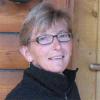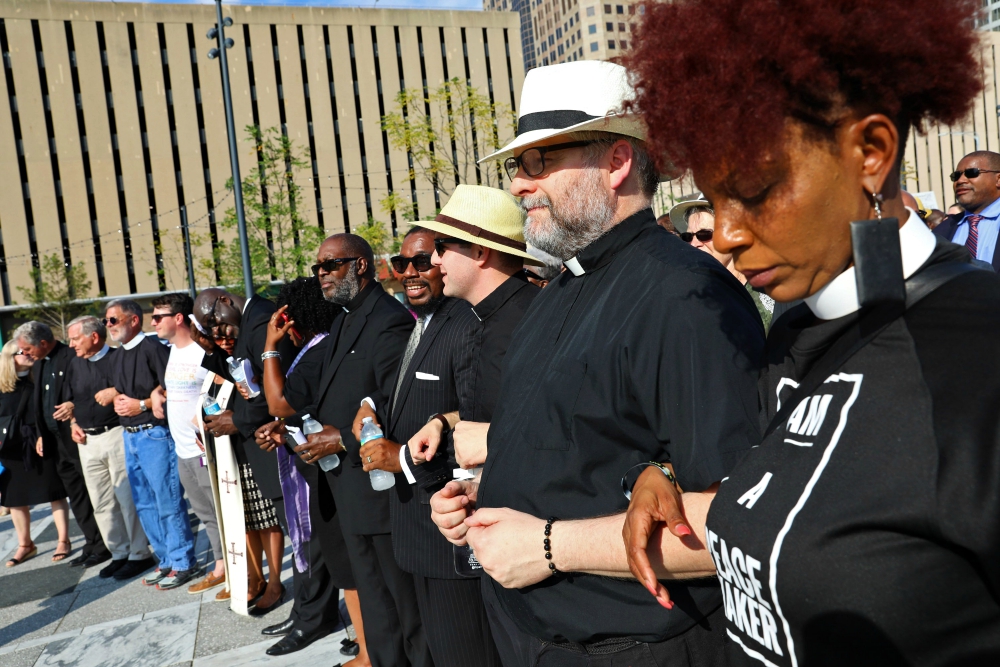
Clergy pray together during in an interfaith prayer service calling for peace and solidarity at Kiener Plaza Sept. 19 in St. Louis. Leaders of several faiths called for peace and justice amid the turmoil that followed the acquittal of a white former St. Louis police officer in the 2011 death of a black man. (AP Photos/St. Louis Post-Dispatch/Christian Gooden)
In the days leading up to a verdict in a high-profile murder case involving a white police officer and a 24-year-old black suspect, the president of the Missionary Baptist State Convention of Missouri appealed to St. Louis Catholic leaders for support.
"They reached out to us," recalled Marie Kenyon, an attorney who heads the St. Louis Archdiocese's Peace and Justice Commission.
" 'We really need the support of the Catholic population. We need you to be part of this,' " Kenyon recalled them saying.
The archdiocese is a major force in the region, with a large school district and the state's second-largest social services infrastructure, as well as numerous Catholic hospitals and universities.
The Rev. Linden Bowie said he appealed to Catholic leaders because 25 percent of St. Louis-area residents are Catholic.
"The racial divide is one thing," he explained, "but there should not be a divide between believers. It was important to ask the archbishop [Robert Carlson] to call for unity, support and peace."
He added, "Their reach is so much greater. The response has been overwhelming."
Just as black organizers half a century ago had asked then-St. Louis Cardinal Joseph Ritter to send people to march from Selma to Montgomery, Alabama, in support of voting rights, and "he sent his best," Kenyon recalled, Bowie asked Catholic faith leaders to support protests and demonstrations in the wake of a much-anticipated verdict on Sept. 15. Former police officer Jason Stockley was acquitted of a first-degree murder charge in the 2011 shooting death of 24-year-old Anthony Lamar Smith, a black man under police pursuit for an alleged heroin sale.
Prosecutors alleged that Stockley planted a gun in the victim's vehicle, and that a video shows the officer threatening to kill Smith. But the judge in the case said the evidence was not sufficient to find Stockley guilty. Protests including both blacks and whites ensued almost immediately and have continued daily since the verdict.
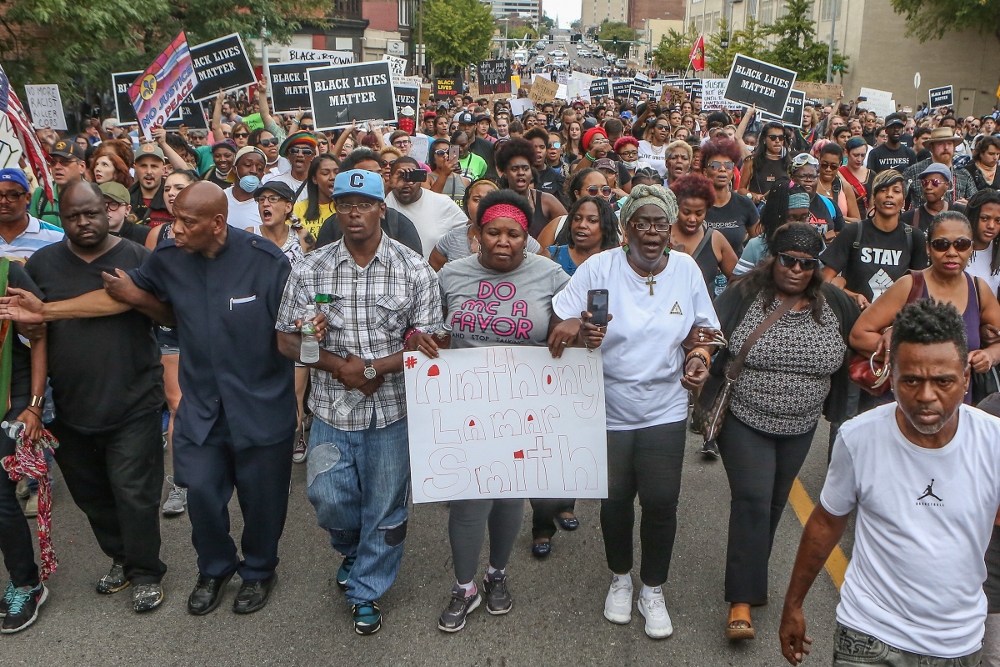
Anthony Lamar Smith's mother, Annie, center, walks with family and protesters during a peaceful rally Sept. 17 after a not guilty verdict in the murder trial of former St. Louis police officer Jason Stockley. (CNS/Reuters/Lawrence Bryant)
The organized and largely peaceful protests, which are aimed at disrupting the economy and business-as-usual in the St. Louis metro area, also cite a string of deaths of black men by white police officers around the country and other wrongs foisted upon the black community.
By day, demonstrators have taken to the streets downtown, in stylish city and inner-ring suburban neighborhoods, and in the more affluent and predominately white western suburbs. But at night, demonstrators not associated with peaceful counterparts have broken shop windows, overturned large flower pots, and even vandalized Mayor Lyda Krewson's home.
Police are working 12-hour shifts, events have been cancelled, social media is aflutter with competing comments supporting protesters or the police, and the weight of yet one more racially charged moment in the city's history is taking a toll.
Bowie said he does not endorse violence or property damage.
"But the thing we have is our dollar. We can disrupt and bring attention to the social ills that we're plagued with" to which "the larger society has turned a deaf ear," he said. "Once the economy is touched and disrupted, everyone wants a solution."
Kenyon said protesters see this moment as "St. Louis' Selma."
Advertisement
St. Louis Archbishop Robert Carlson acted decisively Sept. 15, in the moments after the Stockley verdict, issuing a statement calling for peace and justice but also acknowledging the hurt and anger of African-Americans who feel wronged by society and its institutions.
Carlson also organized an Interfaith Prayer Service for Peace and Solidarity on Sept. 19 in a public space, Kiener Plaza Park, in downtown St. Louis with faith leaders from Catholic, Episcopal, Baptist, AME, Islamic and Jewish traditions. He led and closed the prayer vigil on a scorching late summer day, calling for love rather than hatred and "hope to guide us in these troubled times."
"We're reminded that the smallest of seeds is the mustard seed," he said in an analogy to hope. "May it blossom and grow."
Carlson seemed sober and pensive in his delivery, more soft-spoken and less fiery than his faith-leader counterparts, Rabbi James Bennett of Congregation Shaare Emeth; Mufti Asif Umar, imam of the Islamic Foundation of Greater St. Louis; or the Rev. Karen Anderson, pastor of the Ward Chapel AME Church, and the Interfaith Partnership of Greater St. Louis. Anderson said the protest disruption is a "disruptive grace from God."
"It's God working in us, a time-out for business as usual, a time-out for being complicit in our silence. Pray that God will disrupt us enough that we ask 'what can I do to change the system that puts its foot on the neck of its people?' "
The service, attended by hundreds of people, was followed by a march to nearby City Hall, where participants remained silent while raising their arms for six minutes — one minute for each of the years that elapsed between the shooting in 2011 and the verdict in 2017.
City's history of racism
The first protests in the Stockley case arose downtown, near the St. Louis Civil Courts building where the case was heard in a bench trial. Kiener Plaza Park is within view of one of the city's most famous landmarks, the Old Courthouse, where slaves were auctioned in the 1860s, and where slave Dred Scott and his wife sued for their freedom, but later lost in the U.S. Supreme Court.
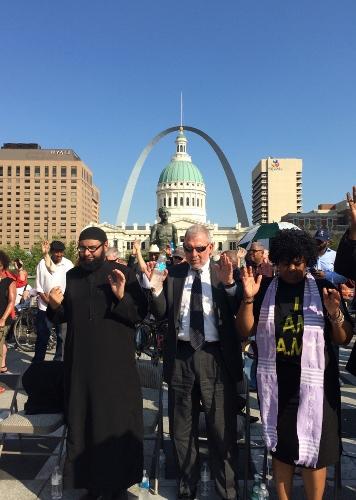
Faith leaders and others attending an interfaith prayer vigil Sept. 19 raise their arms in solidarity as Archbishop Robert Carlson says a closing prayer. (Cheryl Wittenauer)
That legacy of slavery and race problems framed the actions of the late Cardinal Joseph Ritter when he arrived in St. Louis in 1946, a century after the landmark Dred Scott case.
Ritter ordered Catholic schools in the archdiocese to integrate — eight years before the U.S. Supreme Court would order school desegregation in the Brown vs. Board of Education decision. The local decision was unpopular with parents who appealed to the church's apostolic delegate in Washington, who was unsympathetic, according to the archdiocese. Ritter later learned of their plans to sue the archdiocese and stopped them cold with a letter he had penned and asked pastors to read at Sunday Masses. He threatened opponents with excommunication.
Ritter prioritized racial justice throughout his time in St. Louis, organizing the Archdiocesan Commission on Human Rights in 1963, to support preaching and action on civil rights, according to archdiocesan history. But years later, the city and region still struggle to attain racial equity and peace.
Kenyon, who did legal assistance ministry for the archdiocese for 27 years, was tapped to lead the Peace and Justice Commission after the turmoil of Ferguson, a northern St. Louis suburb in August 2014. In May 2015, Carlson appointed 27 people to the commission as a way of paying attention to the forces that led to weeks of protests, demonstrations, violence, property damage and arrests after the shooting death of black teenager Michael Brown by white Ferguson police officer, Darren Wilson, on Aug. 9, 2014. The commission has a task force on racial equity among other working groups and issues.
"Ferguson," Kenyon said, "was a wake-up call to the region. There's a lot of hurt and pain and anger. We need to figure out what we can do to bring justice, so that the black community feels there is justice for them."
Need to acknowledge, heal
On Sept. 9, the archdiocese's North City Deanery had sponsored its second annual pilgrimage across Delmar Boulevard, a symbolic walk from Saint Louis University in Midtown St. Louis to St. Alphonsus Liguori Rock Church on the city's north side. The east-west boulevard, known locally as the Delmar Divide, separates the almost exclusively black north St. Louis from the more prosperous and more racially integrated Central West End and south St. Louis. The pilgrimage, co-sponsored by the archdiocese, stopped along the way at the Juvenile Justice Center, the St. Louis Urban League, and the Clyde C. Miller Career Academy, among other places. The event was billed as a way to build relationships across racial lines.
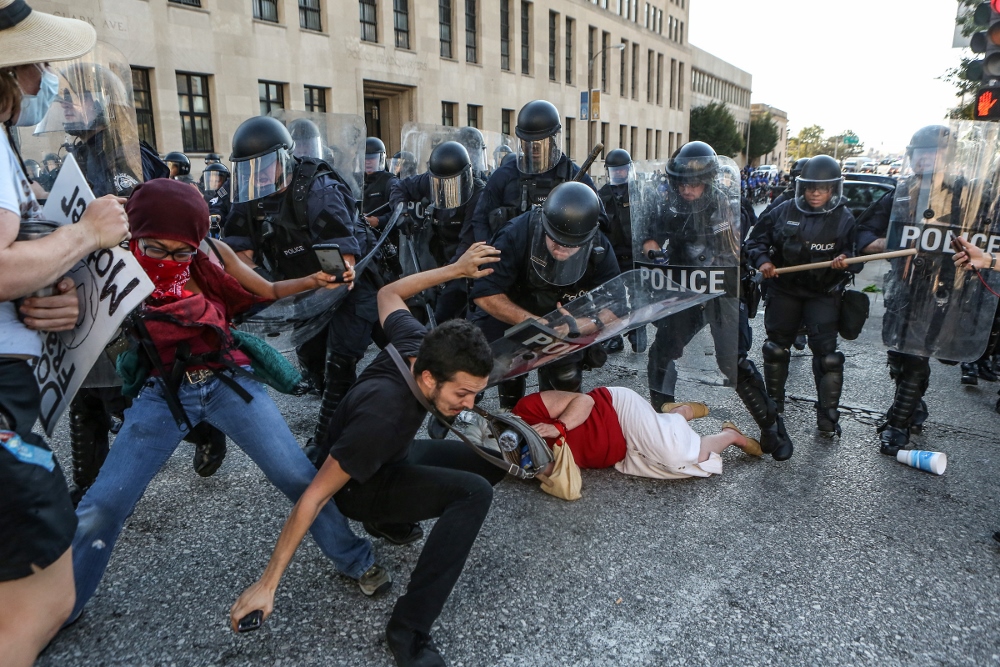
Protesters fall as they are pushed back by riot police during a Sept. 15 protest in St. Louis after a not guilty verdict in the murder trial of former St. Louis police officer Jason Stockley. (CNS/Reuters/Lawrence Bryant)
Some parishes and individual Catholics have been trying to do just that since the uprising in Ferguson, only a few miles from where Smith had been shot three years earlier.
After Ferguson, social justice-minded parishioners of the Jesuit St. Francis Xavier (College) Church, a mixed-race congregation on the campus of Saint Louis University reached out to the peace and justice group of the predominately black Redemptorist parish, St. Alphonsus Liguori Rock Church. The two historic parishes have long been neighbors, but their congregations rarely interacted, each maintaining a comfortable position on either side of the Delmar Divide.
At the first meeting, some in the College Church group suggested the two parishes join forces to pick up litter, plant trees or otherwise clean up the neighborhood. One of the Rock Church members thought they ought to share a meal and fellowship and get to know each other. They began meeting monthly.
They soon discovered some stark differences in experience, culture and perceptions, as well as different views of police, civil authorities and the Catholic Church itself. Their discussions eventually led to a theater production, "Growing Up Catholic: What's Race Got to Do With It?" that explores growing up Catholic from the white and black perspectives. The production was performed by individual parishioners and professional actors last October at Fontbonne University, and will be re-presented Oct. 14-15 at St. Louis University's Tegeler Hall.
"It's God working in us, a time-out for business as usual, a time-out for being complicit in our silence. Pray that God will disrupt us enough that we ask 'what can I do to change the system that puts its foot on the neck of its people?' "
—Marie Kenyon
At an Aug. 28 news conference in downtown St. Louis, some black ministers announced ahead of the verdict that they were "100 percent" behind demonstrations and acts of civil disobedience that would disrupt St. Louis until the black community found justice. Some have chanted, "If you kill our sons, we will kill your economy."
In a Sept. 17 Facebook post, the Rev. Traci Blackmon, a local pastor and executive minister of justice and peace of the United Church of Christ, wrote that "I don't give a damn about your broken windows. Because, clearly, you don't give a damn about our babies' bullet-riddled bodies. I will replace your window. You replace your killer cops … and we still won't be even."
Jesuit Fr. Edward "Ted" Arroyo, a New Orleans-raised sociologist who currently works at White House Retreat in St. Louis County, said he doesn't advocate killing the economy. But he said that sometimes religious leaders speak out for harmony in words that are "too soft."
"There's a tremendous amount of diversity in society," he said. "We're not always going to have a harmonious sound. The burden of the history of racism endures."
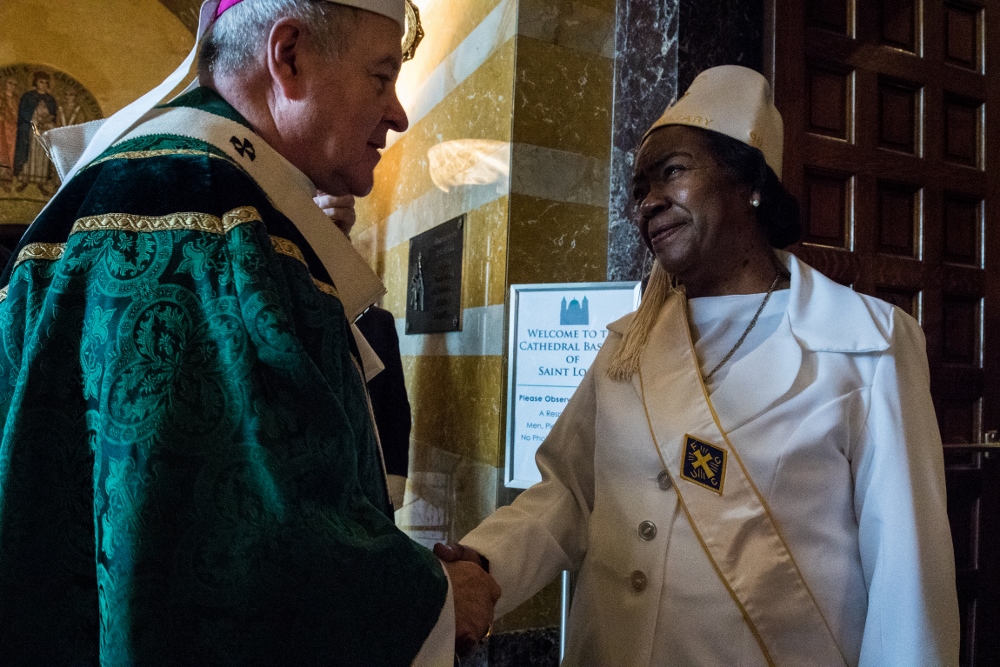
St. Louis Archbishop Robert Carlson greets Ophelia Wilson Court following a Mass for peace and justice Aug. 9, 2015, at the Cathedral Basilica of St. Louis. With a crowd topping 600, the Mass commemorated the first anniversary of the shooting death of Michael Brown, an African-American teen, in a confrontation with a white police officer. (CNS/St. Louis Review/Weston Kenney)
Too often, he said, "I hear religious leadership speak of harmony but not enough about solidarity. We owe solidarity with victims of these types of problems."
Jesuit Br. John Fava, in his 14th year as chaplain to the St. Louis Police Department, said he supports the police and the judge's decision in the Stockley case. He said the faith response is difficult and individual. He knows that his opinion parts ways with that of many of his Jesuit brothers in St. Louis.
Christine Dragonette, who heads social ministry at the Jesuit-run College Church, said Catholics are called to have difficult conversations about race, a particular challenge to white Americans, she said.
Fr. Arthur Cavitt, executive director of the St. Charles Lwanga Center, delivers the homily at the St. Louis Archdiocese's Mass for the Preservation of Peace and Justice Jan. 15. The Mass marked the archdiocese's 41st annual commemoration of the birth and legacy of Martin Luther King Jr.
"Catholic social teaching is not just social work, but justice work as well," she said. "Policy, law and economics affect individual human dignity. This is a very acute moment of anger and reaction to justice not being served in the legal system that people wanted.
"Racism is not just the KKK, but it shows up in our [civic] systems as well. As Catholics, we are called to recognize what faith and the Bible tell us. Just because it's law, doesn't mean it's just."
Fr. Art Cavitt, pastor of St. Nicholas Catholic Church in downtown St. Louis and executive director of the St. Charles Lwanga Center Office of Black Catholic Ministries, was pastor of St. Teresa of Calcutta parish in Ferguson when Michael Brown was shot.
"When these buttons get pushed — Ferguson and now — it's a chance to see how you view yourself in this, your own reaction," he said. "Will you be part of a demonstration or destruction? It's knowing what to do with that anger, channeling it into a passion for something more fruitful."
He also cautioned against the notion that prayer alone will suffice in these circumstances.
"People of faith can also be leaders of societal change," he said, "not just a passive group of holy rollers. It's a lived experience, a sacramental life of living, not just words."
[Cheryl Wittenauer is a freelance writer based in St. Louis.]
